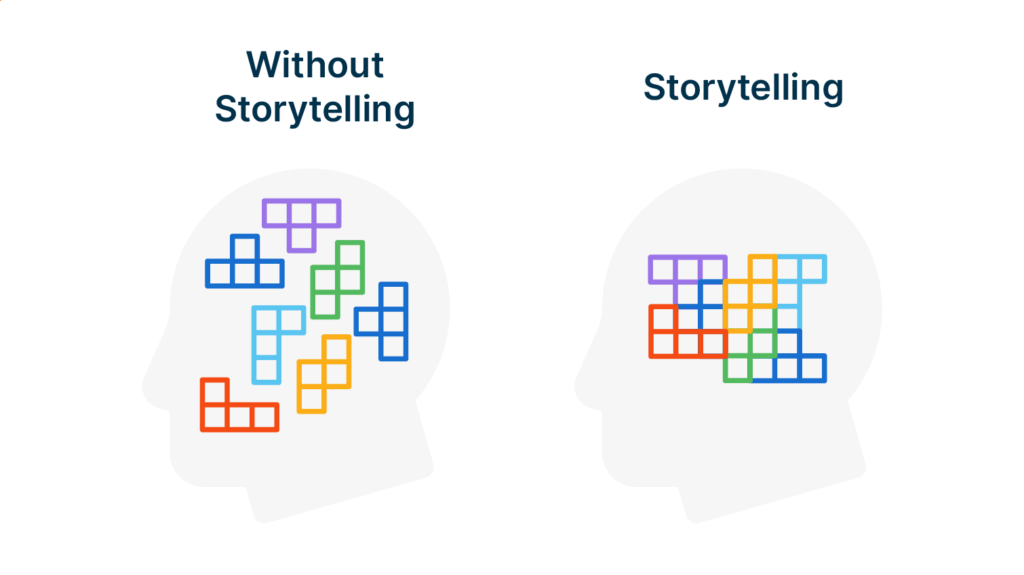Tell people a captivating story, and not only have you gained their attention but most likely their trust and goodwill, as well. In content marketing, when consumers encounter a brand story they like and identify with, there's a 55% chance they’ll become brand advocates, along with 44% increased odds they’ll share content and a 15% boost to impulse purchases.
But does the importance of storytelling in marketing apply beyond content crafted for individual consumers? Do narratives help B2B businesses make decisions?
This guide looks at the case for storytelling in tech marketing and other largely data-driven marketing spaces.
Key Takeaways:
- Storytelling is a powerful framework for effective content marketing
- Storytelling can enhance content marketing efforts in traditionally fact-based marketing arenas such as tech
- Embedding marketing information in a narrative structure can make content more accessible to non-specialists and engender trust and positive emotional response
What Is Storytelling Marketing?
Storytelling in marketing is communicating marketing information and messaging in a narrative format, involving traditional storytelling elements such as characters, dramatic conflict, and resolution. Marketing narratives may recount the origin of a brand or company, the before and after experiences of clients, or even imagined events that invite the audience to assume the central role.
Notable examples of highly successful storytelling campaigns include:
- LinkedIn’s “Picture Yourself” Profile Series: Featured prominent users’ business success stories, offering readers useful insights while building the platform’s credibility
- Intel’s “Beauty Inside” Interactive Videos: Consisted of a series of shorts for which audiences could audition for the ever-changing central role
- Zendesk’s “Zendesk Alternative” Band Content: Used content based on the career of a fictional grunge band named after the company, featuring a dedicated website with music videos
Importance of Storytelling in Tech Content Marketing
Storytelling provides a powerful communicative framework in B2B marketing, where topics can often be dense with technical jargon.
Here are three compelling reasons to incorporate narrative elements into your tech marketing content.
1. Decision Makers May Not Be Tech People
As more industries attempt to embrace data-driven decision making, fact-based marketing may increasingly seem like the only logical choice for effective messaging with B2B tech clients. If your tech product or service has a demonstrable, statistical edge over the competition or industry averages, marketing teams will naturally want to showcase performance stats in their content.
That said, marketing teams must remember that tech decisions don’t always land on the desk of tech people such as engineers and developers. Boardrooms and C-suite executives often make the final call on these.
Consequently, marketers must adjust messaging and content to communicate in equal clarity with people who likely have non-technical backgrounds and qualifications. According to recent research, an overreliance on managerial input and deficits in tech fluency rank No. 1 and No. 2, respectively, among challenges involving executive and boardroom oversight of technical matters.
Embedding your most compelling stats in narrative presentation allows marketing teams to create tech and IT content that capitalizes on the shared human affinity for storytelling, while accounting in advance for unpredictable ranges of technical fluency in the audience.
2. Narratives Affect the Brain and Memory in a Physically Unique Way
The human mind has a far greater capacity to recall events and information woven into a cohesive narrative than to reproduce the same quantity of multiple, discrete facts. According to some estimates, storytelling amplifies human memory 22 times over.
Behavioral psychologists have long observed how stories enhance human memory. However, neuroscience was only able to explain why recently.

The hippocampus is a brain structure in the temporal lobe involved in learning and memory. In recent studies, researchers have observed that when participant subjects attempt to learn and then recall information conveyed through storytelling, the hippocampus engages measurably in both processes. However, when researchers asked listeners to perform the same task for separate, non-narrative events and information, they observed no heightened activity in the hippocampus.
In effect, the power of storytelling to make a stronger impression on audiences than unstructured sequences of facts isn’t just an anecdotal observation. It’s grounded in the physiology of the brain.
Effective marketing in any context relies on a capacity to communicate information clearly and memorably. Savvy tech marketers can leverage this insight for better results using naturally narrative formats such as case studies, client testimonials, and webinars.
3. The Narrative Transport Effect Engenders Trust and Emotional Connection

Old metaphors often contain undiscovered truths. Have you ever described yourself or someone else as becoming “lost” in a story, whether in a novel or movie? Psychologists have a name for this: narrative transportation.
The concept of narrative transportation attempts to explain why people react differently to information presented in stories compared to information conveyed in other formats. Briefly put, narrative transportation theory posits that people see the world differently from within stories. While this idea has explanatory power in a wide variety of contexts, in marketing it allows content developers to zero in on conditions that elicit trust and positive emotional connection from audiences.
According to a 2020 study, the narrative transport effect in B2B advertising has a greater effect on decision-making C-suite executives than on other audience segments. Research found that using storytelling to market to people in executive positions produced greater levels of trust, deeper personal connections, and an increased likelihood of advocating for the business presenting the content.
Custom IT Content Creation with ActualTech Media
At ActualTech Media, our content development team excels at delivering clients custom, on-message tech content in formats including e-books, comics, whitepapers, blogs, and infographics. Our end-to-end services offer complete project management with expert authorship, copy editing, and design.
To learn more, talk with our sales team today.